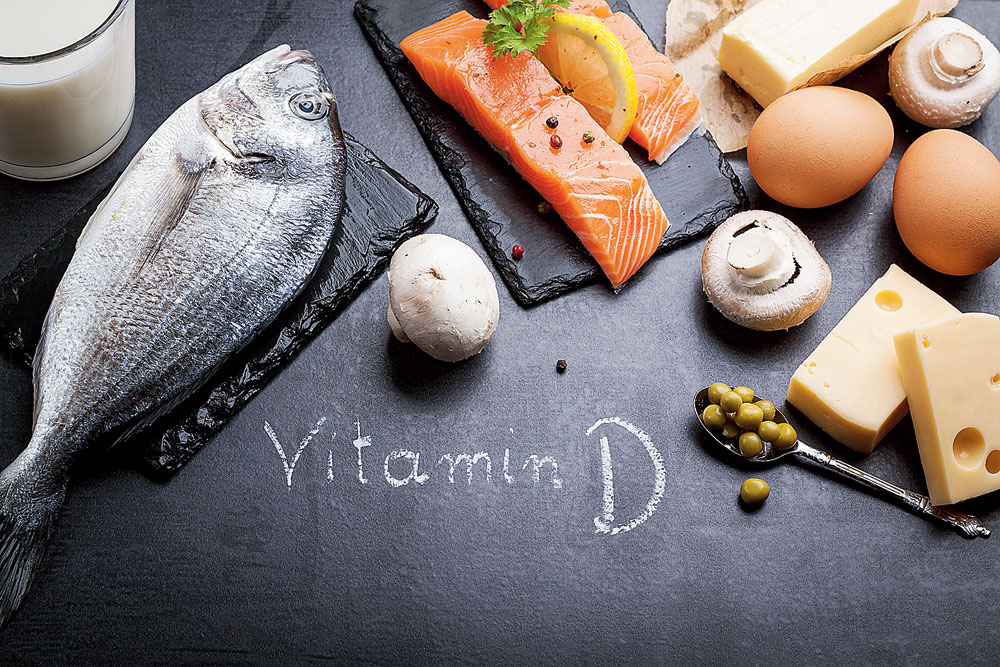Vitamin D — also known as the sunshine vitamin — is extremely important and has multiple effects on several systems in the body. Yet, the prevalence of vitamin D deficiency gets reported worldwide; it still remains an under-diagnosed and under-treated nutritional deficiency.
India being a tropical country has adequate sunlight throughout the year. Yet, the prevalence of vitamin D3 (an important compound in the vitamin D group) deficiency is very high in India;
65-70 per cent of our population is vitamin D deficient and for 15 per cent, it’s insufficient. In fact, worldwide, more than a billion people have low D3 levels. An increased level of melanin pigment in the Indian skin, which gives the skin a brown colour, also makes vitamin D absorption difficult.
Besides this, urban lifestyle — one in which people go to sleep late, have hardly any exposure to the sun in the morning hours, live in air-conditioned environs, tackle high levels of pollution and maintain poor diet — is one of the major contributors to the deficiency.
The role of Vitamin D
Unlike most vitamins (A, B, C, E, K), vitamin D functions like a hormone and every cell in the body has a vitamin D receptor. It is a fat-soluble vitamin and plays a vital role in our day-to-day physiological functions. The role of the vitamin is endless — it helps regulate blood pressure, prevents osteomalacia, helps fight depression, reduces stress and tension, reduces respiratory infections (strong immune system), improves insulin sensitivity, improves overall skin health and makes the skin soft, strong and smooth. Vitamin D3 acts as a steroid hormone in the body, like cortisol, which means it is anti-inflammatory.
It relieves the body of aches and pains by reducing muscle spasms; it improves the health of one’s joints, hair and nails; helps in differentiation of the cells; and improves cardiovascular strength by protecting the arteries. The list, in fact, goes on and on!
When vitamin D3 is low, the body is unable to absorb enough calcium from food, resulting in the production of the parathyroid hormone, which depletes calcium from the skeleton to maintain one’s pH levels.
Who are at risk?
- The elderly.
- The overweight or obese.
- People who don’t eat enough fish or dairy products.
- Those who live far from the equator, where there is little sunshine around the year.
- People who use excessive sunscreen when going out.
- Those who continuously stay indoors.
Symptoms of D3 deficiency
- Poor immunity.
- Pain in the bones and backache.
- Chronic fatigue and tiredness.
- Depression.
- Delayed healing.
- Osteoporosis.
- Hair loss.
- Muscular pain.
- Chronic illness.
In such cases, a simple blood test called 25-hydroxy vitamin D should be done.
Can it cause cancer?
Vitamin D is an essential nutrient that researchers link to the prevention of an array of diseases — colds and flu to multiple types of cancer.
Recently, vitamin D deficiency and its association with the risk of several types of cancer is receiving considerable attention. Studies have found a protective relationship between sufficient vitamin D status and lower risk of cancer. Vitamin D and its metabolites reduce the incidence of many types of cancer by inhibiting tumour growth. A reduced level of vitamin D is associated with increased incidences and death rates from colon, breast, prostate and ovarian cancer.
A warning
However, for severe deficiencies, supplements should be consumed after diagnosis by a medical practitioner. That’s because, although rare, vitamin D overdose or toxicity can be as dangerous as its deficiency. It causes a build-up of calcium in the bloodstream. Symptoms include vomiting, nausea, stomach pain, constipation, diarrhoea, fatigue, dizziness and confusion. It can affect the liver, heart and brain. Too much vitamin D is also detrimental to bone health, leading to bone loss. In extreme conditions, it can damage the kidneys.
Vitamin D deficiency is incredibly common and neglected due to poor awareness.
Also, the symptoms are often subtle and non-specific, which makes it difficult to know if they’re caused by low levels of vitamin D or something else. If you think you have a deficiency, get your blood tested and consult your family physician. Fortunately, vitamin D deficiency is usually easy to fix.
Shikha Prakash is an ayurvedic consultant at Padaav Speciality Ayurvedic Treatment Centre, Dehradun, and a visiting consultant at AMRI Hospital, Dhakuria
Help at hand
- In its most natural form, humans receive the required daily dose of vitamin D from exposure to the sun, especially the morning sun, between 7am and 1pm. You need to sun yourself for at least half an hour with 40 per cent of your body exposed. This practice may be repeated two to three times a week. Of course, one is not supposed to apply any sunblock cream during this time. Spending more time outdoors and enjoying sport of some kind (walking, running, cycling or swimming) are beneficial because physical exercises burn more calories, help reduce body fat and promote higher levels of vitamin D blood cells.
- From a traditional point of view, one can do asanas such as Surya Namaskar (sun salutation) and also the traditional maalish (applying oil all over the body while sitting in the sun).
- Though for severe deficiencies no food can actually provide an optimum supply of D3, but the following food, when taken regularly and in good quantities, maybe of help:
- Vitamin D is a fat-soluble vitamin and so good fats should be taken to enhance its absorption.
- Cod liver oil comes from the liver of the codfish and is considered extremely healthy. It helps ease joint pains and can be taken in capsule form or in the form of oil.
- if you love mushrooms, you are covered. Dried shiitake mushrooms are a brilliant source of vitamin D3 as well as vitamin B. It is low in calorie and can be consumed daily.
- Salmon is another good source of D3, Omega 3 and protein.
- Sunflower seeds not only have vitamin D3 but also come with monounsaturated fats and protein.

Salmon is another good source of D3, Omega 3 and protein. (iStock)










